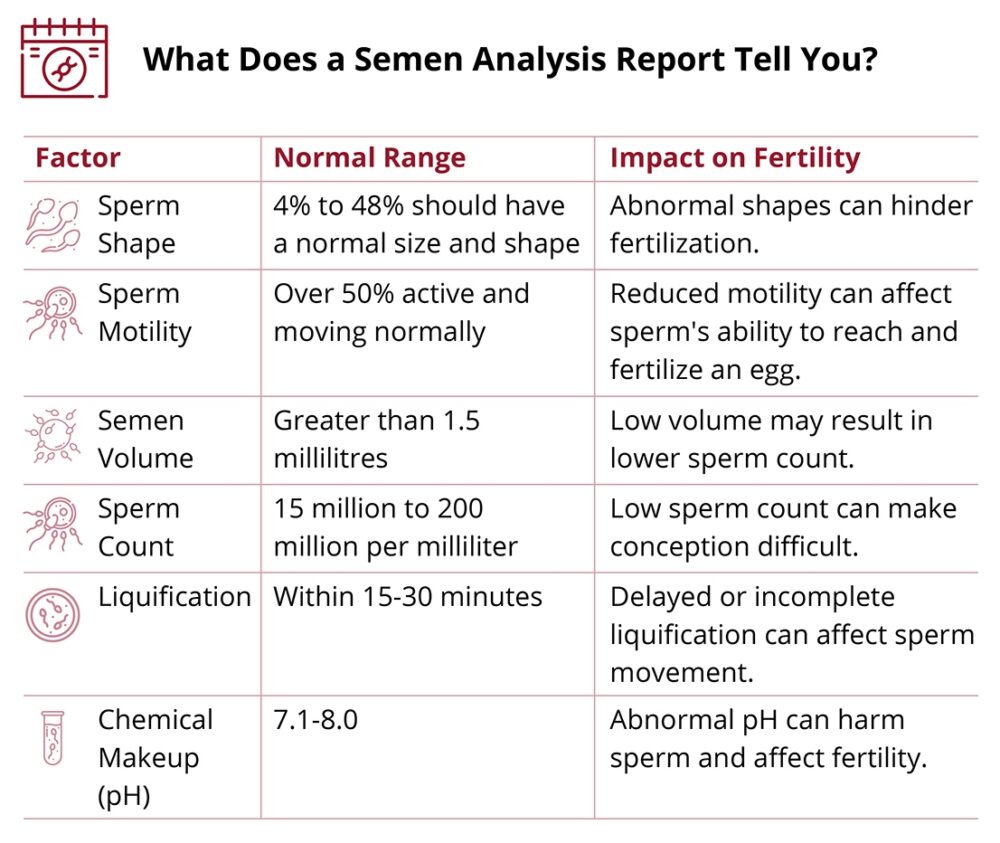As an effective diagnostic tool, a semen analysis provides a comprehensive picture of male fertility. A sperm analysis evaluates several key components, including:
- Sperm Count: This measures the number of sperm present in the semen. A healthy count is crucial for fertility.
- Motility: This assesses how well sperm can move. Effective motility is essential for sperm to reach and fertilize an egg.
- Morphology: This examines the shape and structure of the sperm. Abnormal shapes can hinder fertilization.
- Volume: The total amount of semen produced during ejaculation. Adequate volume is necessary to transport sperm.
- Liquefaction Time: This is the time it takes for semen to change from a gel-like state to a liquid. Faster liquefaction often indicates better fertility.
- pH Level: The acidity or alkalinity of semen. The ideal pH level helps maintain sperm health and mobility.
- Other Parameters: Additional factors like white blood cell count and fructose levels are also analyzed to provide a more comprehensive evaluation.
Why Is It Important?
Just as the health and quantity of a woman’s eggs plays a role in her ability to conceive, a male’s sperm count says a lot about his fertility. A sperm analysis can indicate if a male has any underlying health conditions, existing infections, hormonal imbalances, or genetic abnormalities that could affect his ability to conceive.
The results of a sperm analysis, combined with information about the male’s sexual history and medical history are used by fertility specialists to formulate a personalized fertility plan for both partners.
Whether a male is planning to start a family, starting fertility treatment, or wanting to improve the health of his sperm for future family plans, a semen analysis is the key place to start. It can also be beneficial if the male has had a vasectomy or a vasectomy reversal procedure.
What Can You Expect?
The Procedure
The process of semen analysis is straightforward but requires careful handling to ensure accuracy. A sample of fresh sperm is collected in a sterile container that is provided by the fertility clinic. The container must be sealed properly and promptly and delivered to the clinic or laboratory within one hour of collection.
During transport, the sample container must be kept at body temperature. The ideal temperature ranges between 20 degrees Celsius and 37 degrees Celsius. It is recommended to place the container under your arm or in your shirt pocket, close to the chest to maintain the temperature.
Two samples will be collected over a period of time to ensure the stability of the sperm. At the lab, the sample will undergo a process known as specimen liquefaction for 60 minutes to ensure consistency when testing the sperm. First, the volume of the semen is assessed, followed by the motility, vitality, and morphology of the sperm.
Preparation
Each fertility clinic follows specific guidelines for semen analysis and there are stringent regulations for sperm tests in Ontario. Depending on the fertility plan, the fertility specialist will outline whether the male patient needs to make any changes to his diet, medications, or lifestyle to prepare for the semen analysis.
New sperm is produced constantly and matures between 42 to 76 days. As a result, an infertility specialist will likely make recommendations months before the semen analysis is scheduled. For optimal results, males should refrain from sexual intercourse and masturbation two to seven days before the collection day.
It is also recommended to avoid substances that can affect sperm quality. Processed meat and fish, fatty foods, fried foods, white bread, pasta, and rice can lower sperm count and the quality of the sperm.
There are certain prescribed and recreational medications that may adversely affect the production of sperm. These include but are not limited to, testosterone replacement, antidepressants, anabolic steroids, opiates, blood pressure medications, antibiotics, THC, marijuana, and some cancer medications. It is vital to notify your fertility specialist if you use these and/or other medications and speak to your prescribing physician about whether you can limit or substitute these medications for two to three months before the semen analysis.
Lifestyle factors that impede the production of healthy sperm are smoking, alcohol consumption, lack of exercise, and obesity. Addressing these concerns in the months before submitting a sperm sample can increase the chances of healthy sperm. It is also important to avoid exposure to environmental and chemical toxins, including the use of lubricants during sexual intercourse.
While more studies are required, most fertility clinics recommend that males refrain from wearing tight underwear, sitting for long periods of time, placing heated objects such as laptops near their scrotum, and to using hot tubs and saunas.
Why Choose OFKW for a Semen Analysis?
ONE Fertility Kitchener Waterloo offers a wide range of fertility testing and treatment options, including semen analysis. Our advanced facility is operated by a team of physicians, nurses, administrative staff, and lab specialists who focus on compassionate and comprehensive plans and counselling. We use evidence-based treatments to form individualized care plans.
We provide patient-centred care to ensure semen analysis tests and results are managed with patient comfort, privacy, and confidentiality. Other fertility tests may be performed along with a semen analysis such as hormone tests, physical examinations, genetic testing, sperm DNA fragmentation, anti-sperm antibody tests, post-ejaculate urinalysis, and ultrasounds.
Understanding Your Results
Test results can be expected between 24 hours and one week later, depending on the laboratory used. Your fertility specialist will review all the test results as part of your personalized plan. A normal semen analysis should have a sperm density between 15 million to more than 200 million sperm per millilitre of semen. A measurement of less than 15 million is categorized as low sperm count.
A low sperm count can be attributed to obstructions, testicular failure, or hypothalamic-pituitary failure. Upon further testing, your fertility specialist may recommend the use of fertility drugs to improve the quality and quantity of sperm.
Depending on the test results, a patient may undergo genetic counselling, surgery, or other fertility treatments, as well.

Get Comprehensive Semen Analysis Services at ONE Fertility
Semen analysis in the Guelph region is just one of the fertility treatments and services we offer at ONE Fertility Kitchener Waterloo. Our state-of-the-art facility provides personalized fertility services such as IVF, IUI, sperm banking, and infertility counselling. Contact us at (519) 650-0011 to book an appointment with our fertility specialists.





